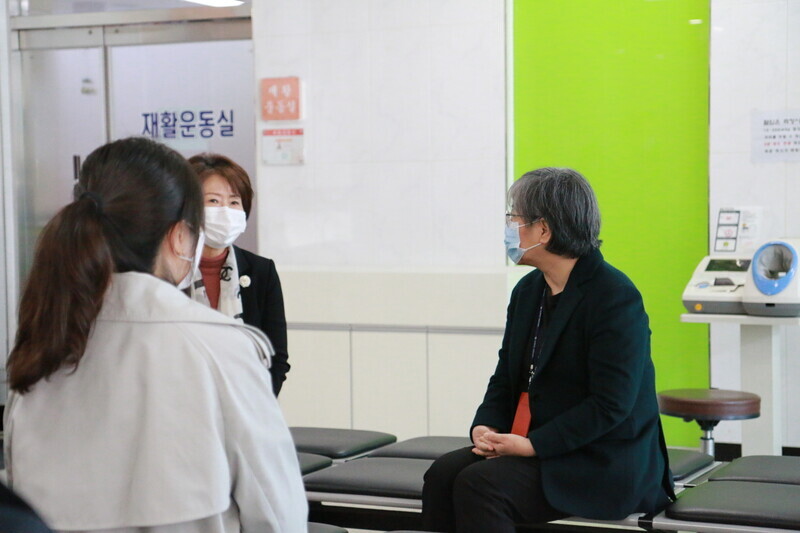hankyoreh
Links to other country sites 다른 나라 사이트 링크
No causal link between vaccination and 72 deaths, experts say

After consulting with experts about 72 deaths reported among people inoculated with the flu shot, South Korea’s Disease Control and Prevention Agency (KDCA) announced on Oct. 29 that none of those cases displayed a strong causal link between inoculation and death. Since people with chronic diseases are highly vulnerable to the flu, the agency emphasized that such people need to be vaccinated during November.
According to the KDCA, 16.44 million doses of the flu shot had been administered as of Oct. 28. Among those vaccinated, 1,551 people reported adverse reactions to the vaccination, and a total of 72 deaths were reported.
The majority of deaths occurred among people in their 70s (62 individuals, 86.1% of the total). 42 of the deaths occurred at least 48 hours after inoculation, while just 12 occurred within 24 hours.
A task force set up to investigate potential victims of the inoculations reviewed 25 reported deaths during a meeting on Oct. 29 and is currently reviewing one more death. The task force, consisting of experts from the KDCA and from the fields of infectious and immunological diseases, had already reviewed 46 deaths through Oct. 26.
Just as in the earlier cases, experts on the task force confirmed that there were no cases of anaphylaxis, a serious allergic reaction, after inoculation. Nor were there any cases of severe adverse reactions among people who had been inoculated with vaccines from the same batch, at the same hospital, and on the same day as those who died.
An examination of individual cases also showed a strong likelihood that the individuals in question died due to deterioration in preexisting conditions. In 11 out of 40 individuals on whom autopsies had been performed as of Oct. 28 with the consent of their family members, the primary visual examination alone showed causes of death unrelated to vaccination, including aortic dissection, cerebral hemorrhage, and pulmonary artery conditions. The other 29 cases also showed signs of pneumonia or heart conditions such as myocardial infarction in the primary examination, with additional testing currently underway to determine the exact cause of death.
The vaccines associated with the deceased individuals reportedly represented 42 serial numbers from eight different manufacturers. Comparison of reported deaths with the number of inoculations by crude solution and manufacturing company did not show a preponderance of deaths associated with any specific solution or company.
In its Oct. 29 briefing, the KDCA advised that in light of the low level of correlation between the reported deaths and vaccines, people should proceed with undergoing inoculations without concern.
Choi Won-seok, a professor of infectious disease at Korea University Ansan Hospital who attended the briefing, said, “An examination of the results of the investigation to date shows that the number of actual deaths [after vaccine administration] has not risen compared to past years, but that the number of reports has increased due to the influence of the earlier death involving a young person [a 17-year-old high school student in Incheon].”
“It is advisable that those who are eligible for national immunization and those suffering from chronic conditions should undergo inoculation within the month of November if possible,” Choi said.
In an effort to alleviate vaccine concerns, KDCA Director Jung Eun-kyeong underwent an inoculation herself the same afternoon at the Heungdeok Public Health Center in Cheongju, North Chungcheong Province.
By Choi Ha-yan, staff reporter
Please direct comments or questions to [english@hani.co.kr]

Editorial・opinion
![[Editorial] Intensifying US-China rivalry means Seoul must address uncertainty with Beijing sooner than later [Editorial] Intensifying US-China rivalry means Seoul must address uncertainty with Beijing sooner than later](https://flexible.img.hani.co.kr/flexible/normal/500/300/imgdb/original/2024/0517/8117159322045222.jpg) [Editorial] Intensifying US-China rivalry means Seoul must address uncertainty with Beijing sooner than later
[Editorial] Intensifying US-China rivalry means Seoul must address uncertainty with Beijing sooner than later![[Column] When ‘fairness’ means hate and violence [Column] When ‘fairness’ means hate and violence](https://flexible.img.hani.co.kr/flexible/normal/500/300/imgdb/original/2024/0516/7417158465908824.jpg) [Column] When ‘fairness’ means hate and violence
[Column] When ‘fairness’ means hate and violence- [Editorial] Yoon must stop abusing authority to shield himself from investigation
- [Column] US troop withdrawal from Korea could be the Acheson Line all over
- [Column] How to win back readers who’ve turned to YouTube for news
- [Column] Welcome to the president’s pity party
- [Editorial] Korea must respond firmly to Japan’s attempt to usurp Line
- [Editorial] Transfers of prosecutors investigating Korea’s first lady send chilling message
- [Column] Will Seoul’s ties with Moscow really recover on their own?
- [Column] Samsung’s ‘lost decade’ and Lee Jae-yong’s mismatched chopsticks
Most viewed articles
- 1[Editorial] Transfers of prosecutors investigating Korea’s first lady send chilling message
- 2[Exclusive] Unearthed memo suggests Gwangju Uprising missing may have been cremated
- 3‘Shot, stabbed, piled on a truck’: Mystery of missing dead at Gwangju Prison
- 4[Column] US troop withdrawal from Korea could be the Acheson Line all over
- 5S. Korea “monitoring developments” after report of secret Chinese police station in Seoul
- 6Could Korea’s Naver lose control of Line to Japan?
- 7US has always pulled troops from Korea unilaterally — is Yoon prepared for it to happen again?
- 8[Column] When ‘fairness’ means hate and violence
- 9[Editorial] Intensifying US-China rivalry means Seoul must address uncertainty with Beijing sooner t
- 10[Book review] Who said Asians can’t make some good trouble?